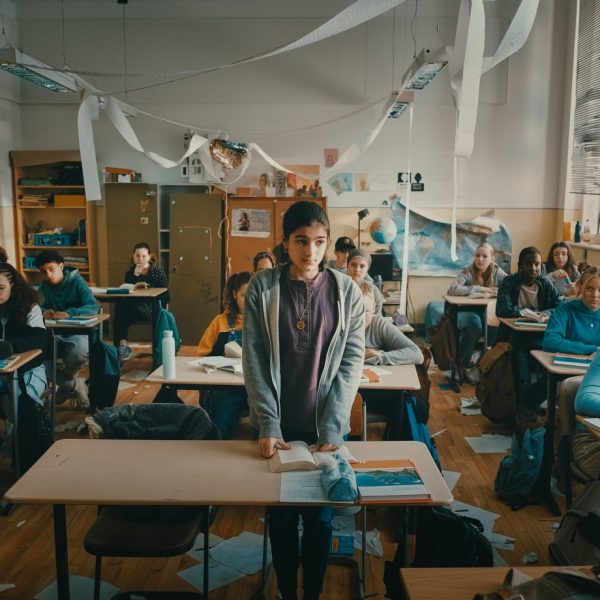The children's film "Sieger sein" opens this year's Kplus section with a wealth of emotions and goosebump-inducing moments. The autobiographical film is about eleven-year-old Mona and her football team trying to win the Berlin schools' football tournament. The film is not only a tribute to a former teacher of director Soleen Yusef, but also provides a stage for topics that concern many children. Mona's escape story and experiences play a major role in the film. The problems, worries and fears are looked at from an eye-level perspective and taken seriously. Instead of confirming a "victim narrative", the strength and willpower of Mona's identity is emphasised. Because the aim behind the tournament is not just to win, but also to create a community. Mona's world revolves around much more than football. The reality of her life has long been determined by global conflicts.
Mona has fled Syria with her family for safety reasons. There she leaves behind her beloved Aunt Helin, who is putting up resistance on the outskirts, and her friends. She also has to give up football for the time being. She had to fight for her passion from an early age. For her, football is not just about chasing the ball, but much more. For her, it's about hope. The hope of scoring a goal. The hope of victory.
In Berlin Wedding, Germany, Mona finds it difficult to start playing football again. The miserable situation at the school is only part of the reason. There is not even a rudimentary structure there. Even the teachers have no control over the situation. The chaos leads to Mona's marginalisation and other classmates also suffer from these circumstances on a daily basis.
Mr Che, the school's last dedicated teacher, brings back hope. With his support, Mona finds her place in the football team. But even there, many small groups form that attack each other verbally, physically and with destructive behaviour. Unfortunately, the actual interesting conflicts and difficulties of the individual classmates are only touched on in passing.
The understanding of community only crystallises after a certain amount of time. Mona plays a decisive role here because she is prepared to fight for victory. The team starts to work together and wins a few victories in the process. But as soon as the girls lose, the conflicts return. They blame each other and Mona in particular. This aspect shows the structures of society very clearly: It is always easy to win together, but going down together remains difficult. This is why the rest of the film can be viewed from different perspectives. The fact that the girls only get a second chance to prove themselves as a team in the final of the tournament throws away the possibility of offering an alternative ending. Losing together could have given a completely different perspective on winning. Because perhaps winning means that they have grown together. On the other hand, the mood and overwhelm in the scene where they reunite is more than expressive.
The support and warm-heartedness within Mona's family provide a deep insight into her emotional world. Mona's father plays a small and interesting role in the film. He is mentioned in just one sentence at the beginning of the film. But in a flashback from Syria, in which the family is in the car and wants to flee, both the father's commitment to his family and the existential aspect of "football" for his daughter are revealed. Mona is desperate to take her own football, a present from her aunt, with her. Her father plucks up all his courage, jumps out of the car and tries to fetch the ball. In this scene, the family constellation is portrayed very clearly and the conflict between security and home is shaken.
The film's plot is very simple, but is more than compensated for by the complexity of the characters. Mona and her classmates learn a lot and develop in an authentic way over the course of the film. Soleen Yusef not only tries to give her personal story space, but also to look at the reality of children with a history of flight today. A successful opening with tangible hope!

